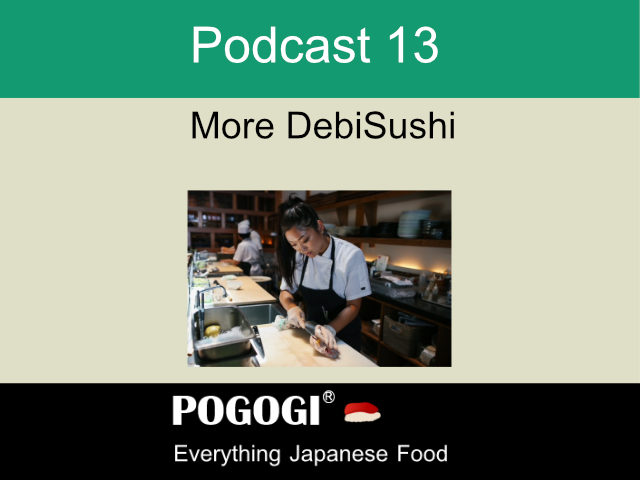Podcast 13 - More DebiSushi

Part 1 - https://pogogi.com/podcast/podcast-10-Innovative-Female-Sushi-Chef-Debi
Highlights
- Recommended fish to start with for Sushi Boxes.
- Tips on freezing sushi/sashimi grade fish.
- How to keep veggies fresh.
- Debi's 3 day rule.
- Want to cook perfect rice?
- Ankimo Monkfish - Underrated and what does it taste like?
Podcast Transcript:
Po: All right back at you with another Pogogi podcast and we're back with Debbie from Debbie's sushi um, jumped right into it. Debbie, how are you?
Debi: I’m good.
Thank you for having me again.
Po: It's our pleasure.
We've been looking forward to this. Our listeners gave us quite a bit of feedback and they loved the first podcast with you.
Yeah. There everyone is just ranting and raving about your sushi boxes and everyone was pretty, everyone, anyone who didn't live in L.A was pretty choked.
So, so what have you been up to since we last spoke?
Debi: Since we last spoke Corona, the pandemic has gone, you know much I would say better. And um, so the business has been slowing down a little bit for me. Um, which is okay because I kind of felt like I needed a break because I was really, really busy for, during the corona times.
So I'm just, you know, figuring out like what I'm gonna do next and stuff like that, like how to improve the boxes and you know how to work together.
Po: I know last time you were, you were saying that you were possibly looking into some restaurants as there, is that still an idea that you're throwing around.
Debi: I am possibly looking for a restaurant but not to open as my own completely, but just to do pop ups here and there.
Po: Oh, I see. Okay. Have you had any new creations since?
Debi: I have been playing around with a couple of things. I have been using a lot of different, like new seasonal fish that I have, I have not used before. A couple of the vegetable dishes, I've been trying to make, you know how we always eat ginger on the side, but I kind of wanted like to make it fun.
So I've been doing like shaved burdock root pickled that, or sauté with soy sauce marinade,
Po: Speaking of fish, what kind of fish are you playing around with?
Debi: So I have been using Shoyuku, which is a baby kampachi. And Kamuzu, is a Japanese barracuda, just whatever seasonal and abudai, let's see, Akamatsu rosie sea bream, that's my favorite one, it's like really tiny fish, but it's like really delicious and really expensive.
Po: It's funny because one of the questions I was gonna ask you, maybe I'll ask you now was like, for home chefs or home cooks who want to try their hand at, you know, sushi boxes or trying to replicate maybe something that you're doing.
What kind of fish would you recommend that they start with? Like if they were going to buy like a go to the their fishmonger get like a whole fish and break it down themselves. Is there any, well, I guess one fish that you would recommend they start and two, any kind of tips that you would give them as far as like processing it, storing it, things like that.
Debi: Oh yeah, for sure. It's actually unless you're really used to like butchering a full fish down. I think it's best if you go to like Japanese market, they already have a portioned out. They already have portioned out blocks of fish that you can use a sashimi.
I mean that would be the best bet because you don't have to purchase the whole fish and eat the whole thing. So this way you will have more variety.
But if you were to go to fishmonger, I would definitely suggest smaller fish because like for example, regular red snapper it's like 60- 80 pieces. So it's kind of hard to eat it by yourself, all of them. Or even halibut is like around 4-5 lbs usually. And it it probably I can cut into maybe 80 slices, 70, 80 slices. You know? So it'll be more fun if you do it, get the blocks. But if you do get it, I think some type of snapper, black sea bream is really small, like Kurodai.
And that would probably make like 20-30 slices. And it's it's fairly cheap cheap fish. So like you won't feel really bad about like breaking it down and making a mess out of it.
Yeah. So I would definitely recommend that the most important thing about storing fish when you're at home is to take out all the blood. There's a bloodline near the spine. So you want to make sure you clean out the blood, like to almost like you can't see anymore underwater.
And then you scrape it and then it comes out and then you want to make sure that they're very dry. You wanna use a lot of napkin paper towel to make it dry. Sometimes I put the fish on a tray, leave it in the refrigerator for a little bit and then it dries out the fish a little bit. And then I wrap it!
Po: What if they, you know, get a block, sushi grade or sashimi grade and they're not able to finish at all. And let's say they're probably not going to get around to, you know, eating it in a, you know, a sensible amount of time whereby they could just put it in the fridge for a couple of days and they wanted to freeze it. What's your opinion on that?
Debi: So there are certain fish that is okay to be frozen. I think, I mean I've tested out a couple of things because I would have so many um leftover fish and I couldn't eat it anymore. Me and my boyfriend, we just can't eat sushi like at home anymore. There's just so much.
So what I do with, well, fortunately I have a super freezer. So I have a tuna pot. So salmon and tuna dave freeze really well. So as long as the blocks are pretty thin, like if it's thick, the middle will gray when you defrost it. So as long as you cut it, slice it into pretty thin layer of a block, then it should freeze well. But there I would definitely suggest not to freeze it. You can always cook it.
But there's also a three day rule for me. I usually don't eat the fish or meat or anything like that more than three days that I kept in the fridge.
If you also use the napkin. Oh yeah. It's really important to use napkin. Like you wrap the napkin around the fish or under the fish. So that sucks out some of the blood and juices. You have to change that napkin every day and it will help the fish to stay fresh better.
Po:That's if you're that's if you got it in the fridge, right?
Debi: Yeah, in the fridge. And that that goes same for vegetables and meat as well. Yeah, like like um green onion for example, if you wrap it in a napkin, it's fresh for much longer.
Po: Really? I'm going to try that.
Debi: But yeah, any vegetables like onion or anything. But you want to change out the napkin,
Po: I'm gonna have to try that because you know sometimes when I have green onions, um sometimes you just can't get to all of them and they start going soft and um it's just not great. You know, they don't have that crispiness to them anymore. I have to try that.
Speaking of, you know, cooking tips and whatnot, I remember in our first podcast, we were, you know, talking about rice and kind of different best practices and things like that. You had mentioned at one point, like some of the things that you do, like some of your routines when it comes to prepping the rice, like soaking it and whatnot. You had mentioned something and we kind of want to get some clarification on this you had mentioned at one to drain like to drain the rice or or rinse the rice or something like that. By that, did you mean like once you finished soaking, just don't use that same water?
Time (7:28)
Debi: Yes, for sure. And you also want to drain out excess liquid Then yeah, if you drain it for about 10-15 minutes and then put it into a pot and do the regular measuring that you do, it'll work. But if you kind of like, don't drain it that well and put it in the excess liquid will mess with the Measuring system.
Okay, I think that's where we were a little bit um confused afterwards because we were like, how do you, what do you mean drain it for 15 minutes? You mean like just have it under constant running water for 15 minutes
Debi: No on a strainer. So you wash the rice for you wash the rice, I have a three or four times roll so I do it three or four times And then I put in a new water and then I soak it for 30 minutes and then I drain it for 15 minutes in a strainer
Po: Like just water like rinsing through it for 15 minutes in a strainer.
Debi: No no no water. So that their you're taking off all the excess water because you know how you were soaking the rice for 30 minutes.
Po: Just like getting all that water like out of it.
Debi: Yeah, just excess liquid.
Po: Okay, forgive me. I'm oftentimes not the sharpest knife in the drawer.
Debi: Oh no, no no, but you have to try it. The rice will definitely taste better.
Po: Okay I'm gonna try that. I haven't tried it yet because I was I wasn't quite sure what you meant but but now I understand what you're talking about.
Kind of a random question for you. What does an average day look like for you?
Po: Okay. Average day. I would say today is my prep day. So I would go to mutual trading, I would go to the fish market, pick up the fish and talk about what's available for next day or whatnot. And then go to the dry goods, Japanese place, drive over there, pick up boxes, um chopsticks, soy sauce containers, what whatnot. Whatever not I need for the week.
And then I would drive it back and haul it back up to my kitchen and then I would definitely work on my orders, talking to my customers what they need. Yeah, and allergies and whatnot. Um, calculating my boxes, sending them invoice stuff like that.
Po: So how do you start your morning? Are you a coffee person? Are you a tea person?
Debi: Oh, I actually don't drink coffee. Yeah, a lot of people think it's so weird, but I just drink water. A lot of water.
Po: Oh, that's good to get you going in the morning though.
Debi: Yeah, I try not to drink coffee because I use the bathroom so much when I, the caffeine makes me use the restroom like every five minutes and um I get very jittery.
Po: That's, that's understandable.
Debi: Yeah, I guess I'm just weak on caffeine.
Po: So it's not that you don't like coffee, it's just you got to go to the bathroom all the time
Debi: And I get jittery and anxious and we talk like I'm like cracked out. So yeah, I do like the smell of the coffee though.
Po: Speaking of that. Um you know, I remember our first podcast, we're talking about, you know, drinks. Um Soju show two things like that. Do you have any yeah, alcoholic recommendations that would pair well with um you know, standard Japanese food. If I can use that description.
Debi: I mean, I mean definitely sake is the best, but for me, I like to eat like even Yakitori or with some white wine, like cold white wine. I feel like it tastes so good with any type of food, but that's just me.
Po: How about do you like red wine?
Debi: I do love red wine.
Po: What kind of japanese food do you think pairs well with red wine?
Debi: I would definitely say more of a hot dishes, definitely Yakitori would parallel, wouldn't you think? Because it's like meat? Sorry, that's my dog. I would think more, more meatier your dish heavier, more warm dishes.
Po: Okay. Yeah, that's fair. What kind of dog do you have? Debi: I have two senior chihuahuas actually. I was quite paranoid today because my dog's been acting up when, you know, right at the times when I, when I need her to be quiet, so I'm super anxious right now because I don't know, you know, if she's going to go nuts at any moment,
Debi: What is she?
Po: She's an english bulldog.
Debi: It's hard because even when somebody walks by the door, they start going crazy.
Po: Do you ever feed your, your dogs any of your creations?
Debi: So with my dogs, it's hard because they're like already 16, 17 and they are very sensitive stomach. Yeah, they're old. But when they were younger I used to give them some cooked salmon that I have like scraps left over. Because I mean I feed them omega three pumps anyway and it's like the same thing. If anything, this will be better, I was thinking, but it upsets their stomach and you know, they go to the bathroom, they do a lot of number three when I do that.
Po: We talked about this one, you know, kind of outside of the first podcast, I don't think it was actually on the podcast, but um I think it was either before or after we were talking about chef Nakayama. Oh yeah, yes, so we had done an interview, not a podcast, it was just like a written interview with Nikki like many years ago and because I had seen her in a, I think it was a wine spectator article Anyway, we reached out to her, she was gracious enough to agree to like a, it's like a written interview and I know that at one point you said that she was quite inspirational to you um have you ever been to her restaurant?
Debi: Oh yeah, I've definitely visit a restaurant, I would say maybe like five years ago, it was like when the chef's table, like pretty much came out almost right after like a year. It was absolutely one of the best meals I've ever had and also she is extremely wonderful, she comes out and greet all the guests after the is done and she is extremely inspirational to me, she actually came up and we took a selfie together, which was amazing and I spoke to her about being the female sushi chef at that time, there were still pretty rare to see any female sushi chefs
And I was like, hey Chef Nikki, like how did you go about, becoming successful, while I'm pretty sure being a female sushi chef is hard, I mean I go through a lot of discrimination myself from customers and coworkers and she told me like she stopped really focusing on being the only female and she started focusing more on like work.
Time(15:43)
I kind of realize, I was always kind of frustrated before about like being the only female and like, you know, just getting so many interest because of just being the female before, I was so focused on that point. Just her saying that's me kind of made me realize, okay, there's like a bigger picture and like, I need to like wake up and not focus too much on it.
Po: So it's kind of like redirecting your energy to something that's more productive.
Debi: But I mean, it's, it's hard though for females out there. I mean, especially sushi chef, it's hard,
Po: What would you were words of wisdom or advice be to other aspiring female sushi chefs that are, you know, considering getting into the industry.
Debi: I would definitely say, you know, stick with it, You know, there's gonna be obstacles. I mean it's same for any job. I would say it's just that being the Sushi Chef, you are probably going to be the only female on the line and you'll be working with men side by side for like 12, 15 hours every day. Oh, I mean, you just have to kind of have a grow, grow like a thicker skin, but you know, work really hard. You know, prove to yourself not to everybody else that you can do. But yeah, just like, you know, keep your head up and keep on doing it.
Po: She has a masterclass episode now, doesn't she? Have you seen it?
Debi: I think I've seen clips of it. Yeah. I've always wanted to, you know, register for, for that subscription, but I just haven't gotten around to doing it. I'll have to get around to doing that one of these days.
Po: Maybe Santa will buy me a subscription. Speaking of Nikki and because she's quite well known now. You know how you had worked for Morimoto back in the day and in, when you met him at napa, have you ever tried to recreate any of his dishes?
Debi: Oh yeah, for sure. I, for me, one of my favourite dishes were his Yellowtail tacos and a couple other, oh wagyu carpaccio is so good over there and Pizza the bluefin pizza. I did try to recreate it many times or try to make it into more of my own.
But from from chef Morimoto's restaurant, the best thing that I've learned is plating, he's so like delicate with his plating. He's so he's really famous for that. He's extremely creative with the plating. So I definitely learned how to visually create my dishes you know for repeatedly from him.
Po: Have you noticed that there's been, have you noticed any copycats of Debbie Sushi boxes?
Debi: I don't know if, I mean yes I have seen two one. They actually use like the same box as me. Yeah but I mean it's it's fine. I'm pretty sure they cannot recreate like everything that I do.
Like considering that like you know, each fish have different preparation for me.
Po: Do you find it flattering or do you find it annoying?
Debi: Sometimes it's annoying if like there was a customer who was like oh I didn't know you were here today and I was like no, I'm not but she thought you know I was in this other side.
Yeah so that one was a little bit like frustrating because I don't want people to mistake other people's work for mine and I'm pretty sure the other chef feels the same way. But yeah it's definitely flattering overall.
Po: Yeah because um well I'll just remind people now like Debi sushi on instagram. D. E. B. I sushi all one word on instagram. That's probably the best way for them to, you know, figure out who's who's who and who's the real deal, right?
Debi: Yes
Po: The last time on the podcast, we're talking about how you often do a, like a fusion of um not only Japanese and Korean, but just kind of everything. Right, can you describe a favourite non Japanese and non Korean kind of ingredient that you think would pair well with Japanese food? Debi: Oh, I have a perfect one. So my boyfriend's Filipino and they use this fruit called Calamansi. So it's like this tiny little lime looking thing, but it's like more circular and it's like maybe like 1/4 the size of the lime.
And it is, it tastes right in between like orange, tangerine and lemon, but it has like its own amazing fragrance. So, I definitely think that would pair really well with many dishes, especially Japanese.
Po: So what would like, what would you do with that with respect to Japanese food? How would you pair that? Like, what would you pair it with?
Debi: So, definitely with white fish. I would make ponzu instead of with some yuzu juice. I'll probably use Calamansi juice. I need to make that actually. I always say it and I never made it, maybe that.
Po: Maybe that will show up in your next box?
Debi: How do you come up with new recipes? Like new ideas. Where do you get your inspiration from?
Debi: A lot of my inspiration comes from me just eating a lot. I love eating out and if I find something that I really, really like, I either try to recreate it and then I taste it and then I see if it will goes well with certain things. Like I don't know if I told you last time, one of my favourite things that I had in Thailand was their egg omelet, which is like so simple, it's just omelet with fish sauce.
Po: Sometimes simple is better, right?
Debi: Yeah, but it's like, it's also how they, how they make the egg, like egg can be made into so many different things, but like this omelet wasn't just like regular omelet, it's called Kai Jai., They kind of fry it so it puffs up and oh man, it's really good with sushi rice actually.
I made like sushi out of that for one of my pop ups before because that would be one of my examples.
Po:: Do you have any tips for people that they could use to make the most out of their dining experience in a Japanese restaurant.
Debi: I mean it is best if you have like a Japanese friend who's been there and knows like what to order? Mhm, I think that's always best for any type of ethnic food. Like even Korean food. Like it's best to have a Korean friend. You know that knows what to order because there's always that hidden menu that only their race knows.
So I would definitely say that if not ask the server, I always ask the server like what is the most popular menu? And I always order that one dish for sure.
Po: You been to Japan before?
Debi: I have when I was really young.
Po: So I was gonna ask you if you had any crazy food experiences.
Debi: That’s when I was in fourth grade and I just remember eating so much salmon sashimi and the chef was so surprised how much I could eat. He was like, I can't, I've never seen such a girl like eat this much salmon before. It was just a sashimi too.
Time (24:20)
Po: Okay, last question for you. So in terms of Japanese food and probably restaurant related, something people you may have seen oftentimes but haven't tried but should
Debi: Ooh, definitely Ankimo is monkfish liver is my favourite. Absolute favourite. I
Po: No, but that is something that I it's just like where, where, where we are. I don't think we have access to that. Like I've never seen a Japanese restaurant ever that I've been to and maybe I'm going to the wrong places. But, but especially where I am, I am Pretty much 100% certain that none of the restaurants where I am anyway, offer that.
Debi: That’s so sad. For me like it's like a perfect sake like appetizer. Like I can just like munch on it with sake. Like for like hours.
Po: What does it taste like? Can you describe that for our listeners?
Debi: A lot of people describe it as like oceans foie gras. But I think it's a little bit different. I mean it's just like this really soft. Like it has like a very Umami like aftertaste but it also depends on how the chef prepares it. But it's really good. I don't know. It's kind of like definitely livery really fat liver taste. I really like, I love foie gras as well.
Po: Is it expensive?
Debi: It’s not as expensive as foie gras. So I would say like three like round pieces. Like I would say like for two people to share as an appetizer, I think it's like around $20 in L. A.
Po: Is there any parting words that you would like to share with our listeners.
Debi: No but you guys can check me out at Debi Sushi on Instagram and give me some support. That will be awesome.
Po: You have like 10,000 plus subscribers now, don't you know?
Debi: I just hit 10,000. Yeah, congratulations all organically. That's awesome. Thank you.
So folks, again, please check out Debi's creations and check her instagram page at Debi Sushi on instagram, D E B I Sushi. All one word on instagram.
If you're in L.A, check out her boxes, order them, order 10. You won't be disappointed until then. And hopefully if we're lucky enough in the, in the future, we can catch up again.
Debi; Yes.
Po: Great! Okay. Until then we will catch you on the next podcast.





